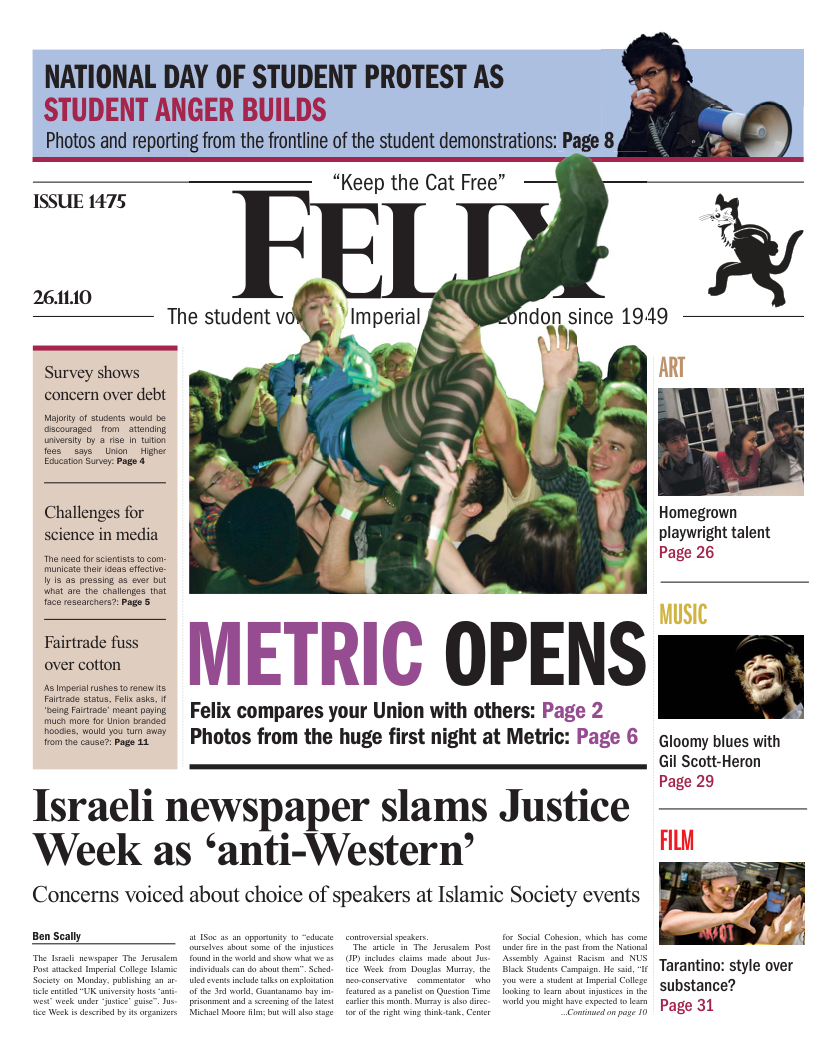Losing proportion
Today’s strident, aggressive atheists want to fit under the umbrella of ‘secular humanism’ – but do they deserve to?

Towards the end of my second year at Imperial, I was approached by the chair of what was then the Atheist and Agnostic Society with a view to becoming his successor as official Union Antichrist. Owing to a number of other commitments that would have made Beelzebub blanch, I regretfully declined. Much to my chagrin, the society has since done likewise.
Now, older and wiser as the specialists suppose me to be, I look back on that decision with tremendous gratitude towards my former self. I hasten to add that this has nothing to do with the ludicrous suggestion that I have since found god, nor to the frankly terrifying suggestion that god has since found me.
My issue with any grouping of individuals based on a common atheism is that such a grouping entirely misses the point. Atheism is not a way of life. It is not a mindset. It is not a school of thought. Individuals for whom the refutation of a creator is an overriding preoccupation seem to me to be leading narrow and unimaginative lives. At any rate, certainly no broader or more imaginative than those who are preoccupied with proving the creator’s existence.
Atheism, for all its importance in this 21st Century world of Dawkins, Hitchens and Ratzinger, is no more than a consequence of having a logically trained mind. Inevitable, but in no way noteworthy. To claim that a non-belief in god should somehow be the dust jacket illustration for post-Enlightenment humanism is to show a tragically warped view of what is contained in the blurb.
The rational thinker will not find sufficient evidence for the existence of a god – any god – in the world as we know it. This is hardly a unique conclusion, as they will also fail to find evidence for gnomes, ogres, unicorns, smurfs or any trace of humour in BBC 2’s Miranda. The need to trumpet any one, logically unremarkable stop along this mental highway seems to me to undermine the sense behind taking the journey.
A credible justification for this preference arises from the comparative lack of extremism displayed by believers in smurfs or gnomes – although people who find Miranda Hart amusing are capable of any monstrosity. Nonetheless, it is true that the ubiquity of religious belief in America still precludes the election of an openly atheistic President, and accusations of blasphemy can still cause writers and cartoonists to run for cover.
None of that interests me for the moment. This piece is unlikely to reach the depths of the Bible Belt, and my charming though prolix style is unlikely to win me over any supporters in the Vatican. The only people that matter to me are you – the readers, and the only issue I feel comfortable addressing is the tenor of debate on campus.
And as far as I’m concerned, something somewhere has gone terribly wrong with the way self-styled ‘secular humanists’ deal with their religious confrères. Lean back in your chairs for a moment, and join me on a little thought experiment. Not to worry – won’t take a minute. Which would you rather be: a lone atheist in a group of religious students, or a lone Christian, say, who has fallen in with Dawkinsians? Which would make you feel more comfortable? Where, to use a loathsome weasel word, would you feel that you were being respected?
Were I asking this question at the height of Torquemada’s excesses in Spain, or in the presence of the sinister cronies of medievalist ayatollahs, I would perhaps expect a different answer. But among today’s enthusiastic guardians of rationalism there is an unforgivable aggression towards those espousing the supernatural or the spiritual.
The sad truth is that we are not automata capable of making decisions based entirely on a sequence of logical decisions. We gloriously and subjectively prefer yellow to red, choose to listen to Verdi over Wagner, and irrationally love our partners more than the billions of alternatives the world has to offer. These are not decisions we can justify or explain – and so long as we are aware of this demon in the machinery there is no reason to suspect we are any the poorer for it.
Humanism at its most fundamental level embraces the individual over the organisation. Our right to be free of overarching religious dogmas or political affiliations, and our duty to respect each other in this one life we possess.
It saddens me that those who claim to be motivated by such sentiments are so blindly set on neglecting them when it gives them a chance to sneer at others. One does not become a bigger person by knocking down someone else’s god – one becomes a bigger person by throttling one’s own ego.






